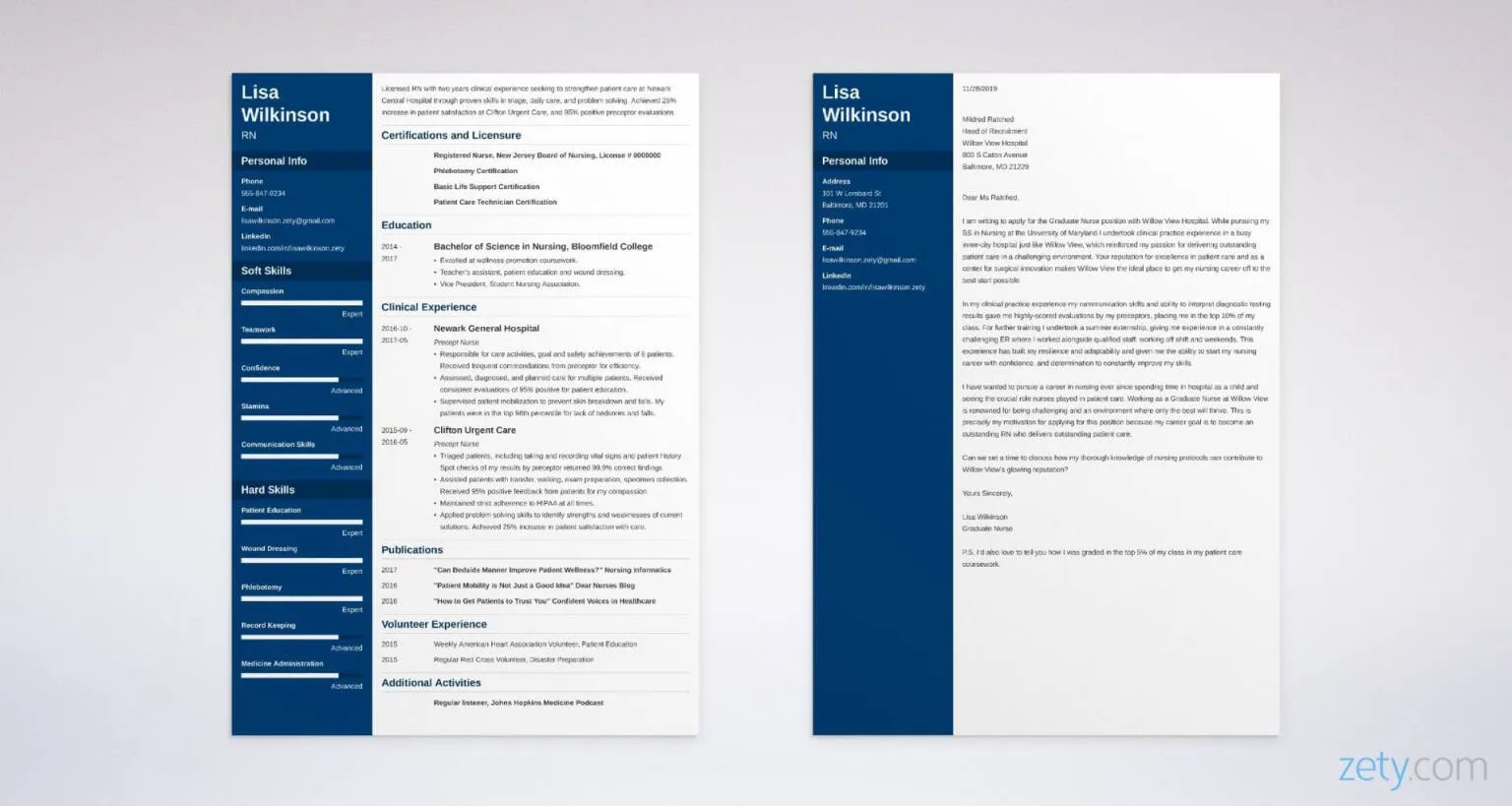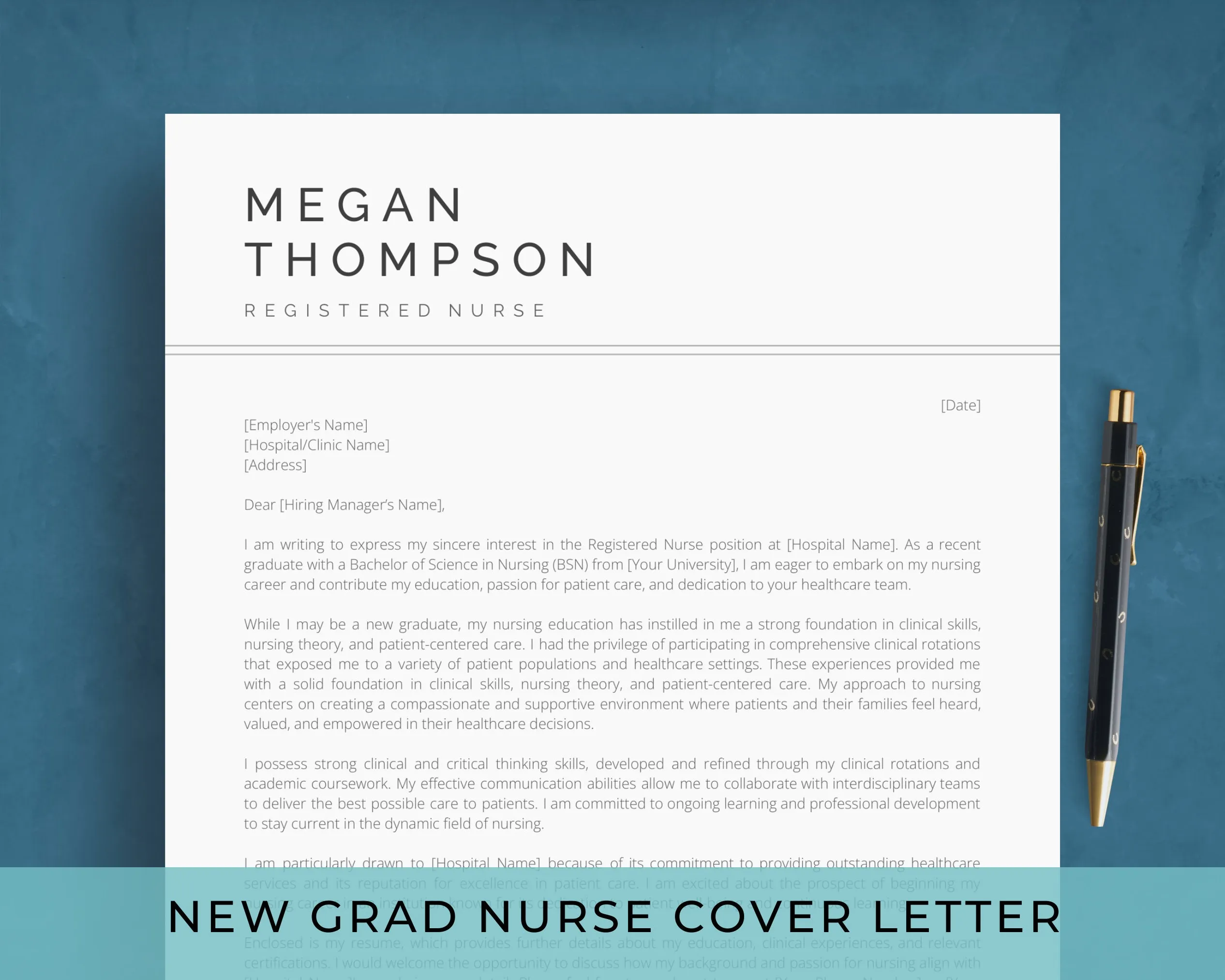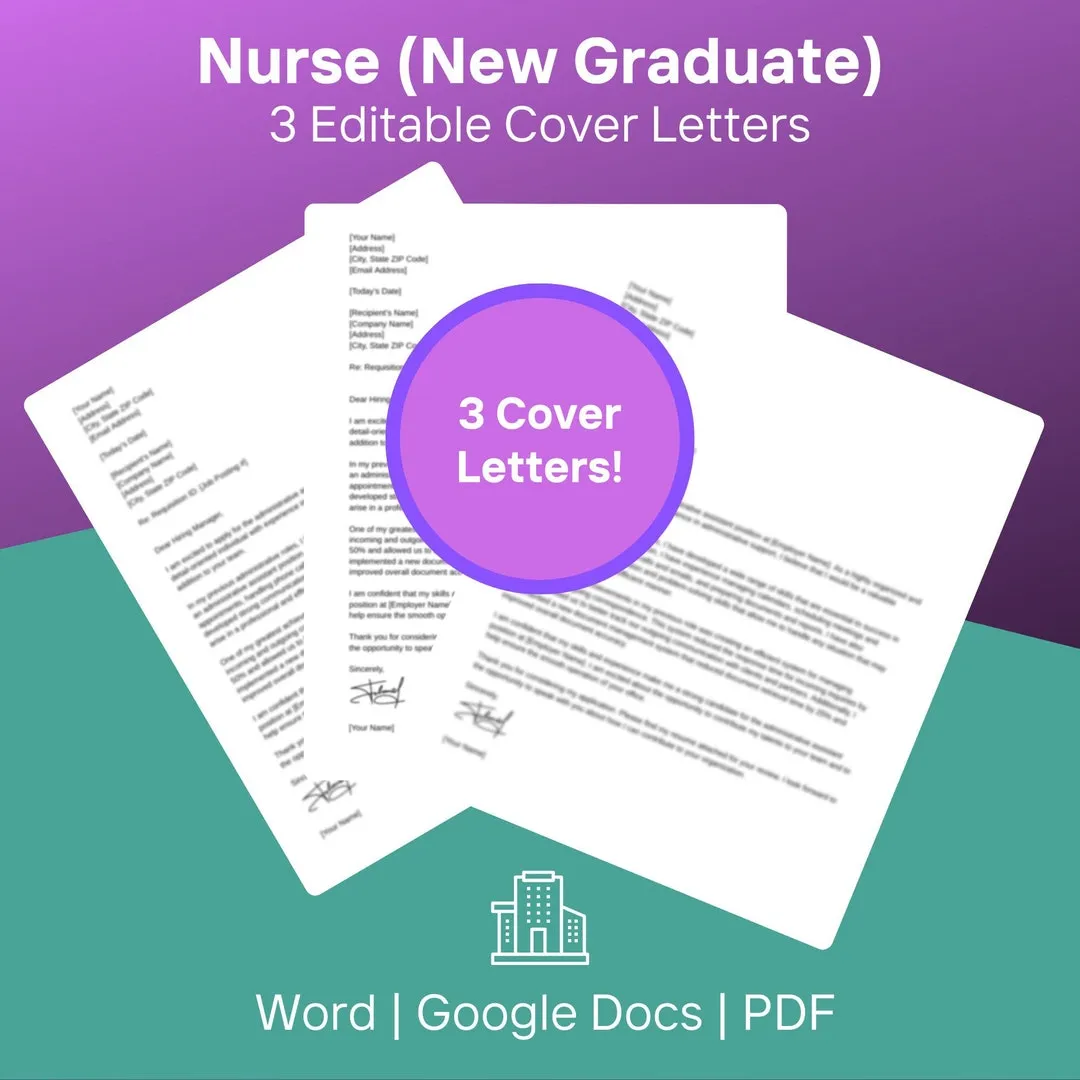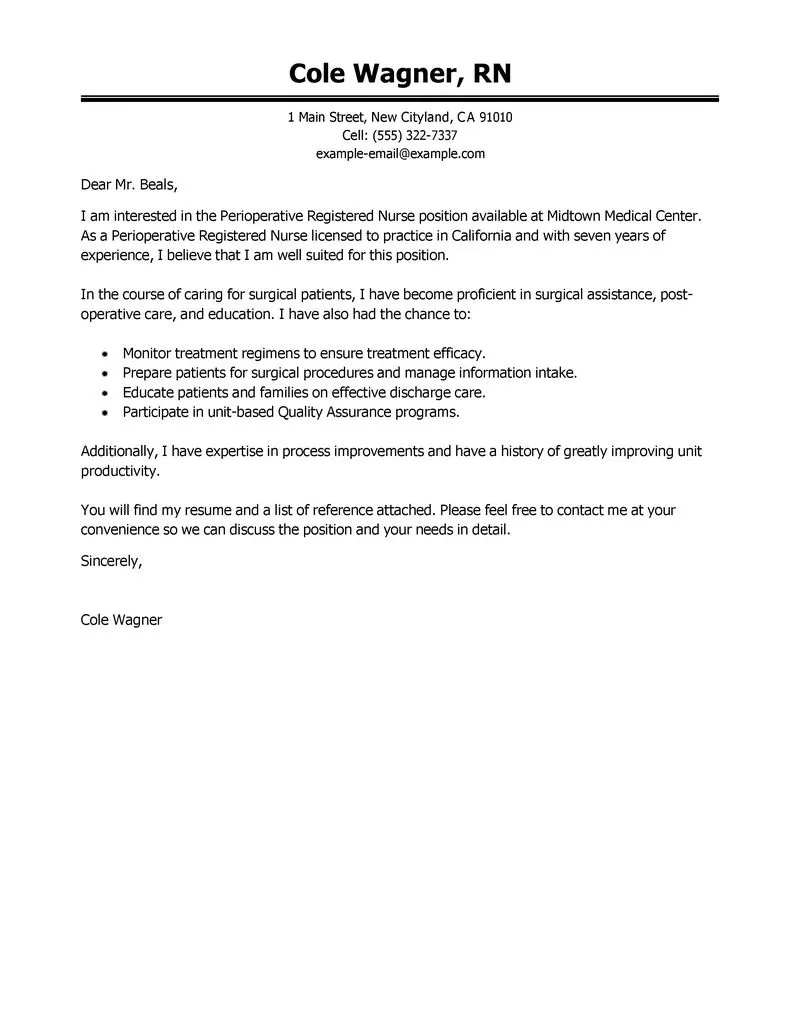Understanding the Importance of an RN Cover Letter for New Grads
As a new graduate registered nurse (RN), you’re stepping into a competitive job market. Your cover letter is your first impression – a crucial document that introduces you to potential employers and sets the stage for your application. It’s not just a formality; it’s your chance to highlight your unique qualifications, passion for nursing, and suitability for the specific role. Unlike experienced nurses who can lean on years of experience, new grads must leverage their education, clinical rotations, and soft skills to stand out. A well-crafted cover letter demonstrates your professionalism, attention to detail, and commitment to providing excellent patient care. It complements your resume by adding context to your experiences and articulating your career aspirations. Therefore, taking the time to create a compelling cover letter is essential for landing your dream nursing job and launching a successful career.
Highlighting Your Nursing Education and Skills
Your nursing education forms the bedrock of your professional capabilities. In your cover letter, clearly and concisely outline your educational background, including the name of your nursing school, the degree earned (e.g., Bachelor of Science in Nursing), and your graduation date. Briefly mention any academic achievements, such as honors or awards, that demonstrate your dedication and excellence. Beyond your formal education, highlight the key skills you’ve acquired during your studies. These might include patient assessment, medication administration, electronic health record (EHR) proficiency, and proficiency in various nursing procedures. Avoid simply listing skills; instead, provide specific examples of how you’ve applied them in clinical settings. For example, describe a situation where you effectively assessed a patient’s condition, administered medication safely, and documented the outcome accurately. Use action verbs to describe your abilities such as ‘assessed’, ‘administered’, ‘monitored’, and ’educated’. This approach showcases your practical skills and demonstrates your readiness to contribute to a healthcare team.
Detailing Clinical Experience and Rotations

Clinical rotations are where theory meets practice, so they are a crucial component of your cover letter. When describing your clinical experience, be specific about the settings where you’ve worked, such as medical-surgical units, intensive care units (ICU), emergency rooms, or pediatric wards. Mention the duration of each rotation and the types of patients you cared for. Go beyond simply listing your experiences; provide concrete examples of your accomplishments and responsibilities. For instance, describe a time you successfully managed multiple patients, collaborated with a healthcare team, or resolved a critical situation. Quantify your achievements whenever possible. For example, mention the number of patients you assisted or the specific improvements you made in patient outcomes. This section should highlight your hands-on skills, your ability to adapt to different healthcare environments, and your commitment to patient well-being. Showing how you have applied your knowledge in real-world scenarios is key. Remember to emphasize any specialized training or certifications you’ve obtained during your rotations, such as BLS, ACLS, or specific unit-based training.
Showcasing Soft Skills and Personal Attributes
Soft skills are as important as technical skills. In your cover letter, emphasize your soft skills and personal attributes that make you a well-rounded nurse. Highlight your communication skills, emphasizing your ability to interact effectively with patients, families, and colleagues. Provide examples of how you’ve communicated complex medical information in a clear and empathetic manner. Demonstrate your teamwork abilities, showcasing your capacity to collaborate with healthcare professionals from various disciplines. Describe how you’ve participated in interdisciplinary meetings, shared information, or resolved conflicts constructively. Also, demonstrate your problem-solving skills by describing how you’ve assessed difficult situations, made critical decisions, or implemented solutions to improve patient care. Emphasize your adaptability and willingness to learn, especially as a new graduate. Highlight your enthusiasm for nursing, your commitment to patient care, and your dedication to lifelong learning. Emphasize your empathy, compassion, and ability to build trust with patients and families. These qualities are essential for building strong relationships and ensuring positive patient outcomes.
Tailoring Your Cover Letter to the Job Description
Each cover letter should be tailored to the specific job you’re applying for. Begin by carefully reading the job description and identifying the key requirements and qualifications that the employer is seeking. Then, review your resume and cover letter, making sure to emphasize the skills and experiences that align with those requirements. Use keywords and phrases from the job description throughout your cover letter, but be sure to do so naturally and authentically. Avoid generic statements and instead provide specific examples that demonstrate your ability to meet the employer’s needs. Show that you understand the role’s responsibilities and have the relevant skills and experience. Research the healthcare facility or organization to which you’re applying, and show your interest in their mission, values, and patient care approach. This shows that you have taken the time to learn about the organization and are genuinely interested in working there. This customization helps your application stand out from the rest and increases your chances of getting an interview. Address the hiring manager by name whenever possible, showing that you are paying attention and have done your research.
Formatting Your Cover Letter for New Grad RN Positions

The format of your cover letter is crucial for making a good first impression. Use a professional and easy-to-read font, such as Times New Roman, Arial, or Calibri, and set the font size to between 10 and 12 points. Maintain a clean and organized layout, with clear margins and spacing. Begin with your contact information at the top, including your name, address, phone number, and email address. Then, include the date and the hiring manager’s name, title, and address. Address the letter to the hiring manager by name. Use a formal and respectful tone throughout your letter. Keep the letter concise and focused, aiming for one page in length. Divide your cover letter into logical paragraphs, each addressing a specific topic. Use headings or subheadings to make your letter easy to scan. Include a strong opening paragraph that captures the reader’s attention and clearly states your interest in the position. End with a call to action, expressing your enthusiasm for the opportunity and indicating your availability for an interview. Proofread your cover letter carefully for any grammatical errors or typos before submitting.
Key Phrases and Action Verbs for Your Cover Letter
Using strong action verbs and impactful phrases can significantly enhance your cover letter. Begin each sentence with a strong action verb that describes your skills and accomplishments. For example, instead of saying ‘I was responsible for patient care,’ say ‘Managed patient care,’ ‘Administered medications,’ or ‘Assessed patient conditions.’ Use phrases that highlight your skills and achievements, such as ‘demonstrated proficiency in,’ ‘successfully implemented,’ or ’effectively collaborated with.’ Emphasize your commitment to patient care by using phrases like ‘dedicated to providing,’ ‘passionate about,’ or ‘committed to ensuring patient well-being.’ Quantify your achievements whenever possible. For example, say ‘reduced patient falls by 15%’ or ‘improved patient satisfaction scores by 10%.’ Use industry-specific language, such as ‘EHR,’ ‘HIPAA,’ or ‘patient-centered care,’ to demonstrate your knowledge and understanding. Use positive and confident language, but be honest and authentic. Tailor your language to the specific job description and the healthcare facility’s values. Avoid jargon or clichés, and always ensure your writing is clear and concise. By selecting the right words, you can increase the impact of your cover letter.
Proofreading and Editing Your Cover Letter
Proofreading and editing your cover letter is a critical step in the application process. After writing your cover letter, set it aside for a day or two, and then return to it with fresh eyes. Carefully review your letter for any grammatical errors, typos, or spelling mistakes. Check for consistency in formatting, such as font size, spacing, and margins. Read your cover letter aloud to identify any awkward phrasing or unclear sentences. Ensure that your cover letter flows logically and that each paragraph supports your overall message. Ask a trusted friend, family member, or career advisor to review your cover letter. They can provide valuable feedback on your writing and identify any areas for improvement. Make sure all your information is accurate, including the hiring manager’s name and the organization’s address. Before submitting your cover letter, ensure that it is free of errors and presents you in the best possible light. Taking the time to proofread and edit your cover letter demonstrates your attention to detail and professionalism. This attention can significantly improve your chances of receiving an interview.
Common Mistakes to Avoid in Your New Grad RN Cover Letter

Several common mistakes can weaken your cover letter. Avoid generic cover letters that are not tailored to the specific job or organization. Generic cover letters make you appear uninterested and reduce your chances of getting an interview. Do not simply repeat information from your resume. Instead, provide context, expand on your experiences, and highlight the skills most relevant to the position. Avoid using jargon, clichés, or overly complicated language. Keep your language clear, concise, and easy to understand. Do not make any grammatical errors, typos, or spelling mistakes. Proofread your cover letter carefully before submitting. Avoid being overly self-centered or boastful. Focus on how you can contribute to the healthcare facility and the benefits you can bring to the team. Do not include irrelevant information, such as your personal hobbies or interests. Keep your focus on your nursing qualifications, skills, and career goals. Avoid a negative tone. Focus on your strengths and accomplishments. Be positive, enthusiastic, and professional. Avoid making any negative comments about previous employers or experiences.
Examples of Strong Cover Letters for New Grad RNs
Reviewing examples of strong cover letters can provide valuable insights and guidance. Search online for cover letter examples for new graduate registered nurses. Look for examples that highlight relevant skills, experiences, and qualifications. Pay attention to the structure, format, and language used. Many nursing career websites offer sample cover letters that you can adapt to your needs. Use these examples as a template and tailor the content to your specific situation. Note how the cover letters address the specific job requirements and highlight relevant skills and experiences. Observe the use of action verbs, key phrases, and industry-specific language. Review the tone and style of the cover letters, and adapt them to your personality and the healthcare facility’s culture. Remember that the best cover letter is one that is well-written, tailored to the specific job, and reflects your unique qualifications and experiences. Use the examples as inspiration, but always customize your cover letter to reflect your individuality and express your passion for nursing. By studying these examples, you can learn how to showcase your strengths and make a strong impression on potential employers.
